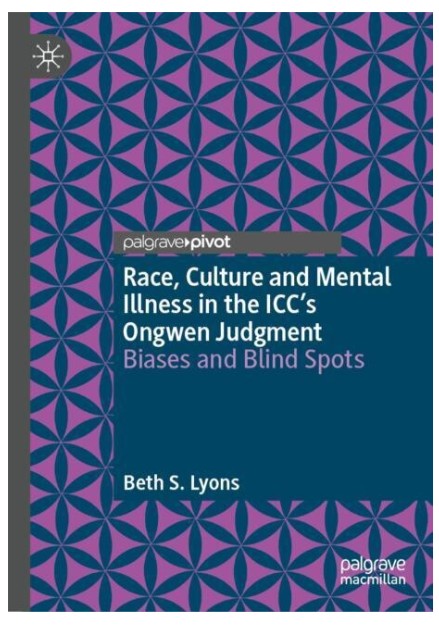This Is More Than a Legal Read

Let me first confess that I read this book because it was written by a very longtime friend. The title is deceptively academic and hides an incredibly important work that, while focused on legal proceedings, is about much more. As a result, I am so glad that I read it!
Race, Culture and Mental Illness in the International Criminal Court’s Ongwen Judgment: Biases and Blindspots.
By Beth S. Lyons
Palgrave MacMillan; 133 pages
December 19, 2024
Hardcover: $65.95; E-book: $47.99
ISBN: 9783031736827

The focus of the book is on Dominic Ongwen, a former soldier in the cultish army known as the Lord’s Resistance Army in northern Uganda. Ongwen had been kidnapped by the LRA when he was nine years old and transformed into a soldier and criminal through ruthless indoctrination and ruthlessness. In the International Criminal Court his defense counsel pleaded his case, arguing that he was—and remains—a victim of mental and emotional disorders that were directly related to the brutal existence he experienced in the LRA and, therefore, he should not be found guilty of the crimes that he committed.
Lyons’ book is both dense and passionate. As a member of the defense team, she carefully and in immense detail, explains the arguments of both sides and the approach the defense team attempted. But that is not the central importance of the book. What Lyons explores are what she identifies as “blindspots” on the part of the court that are directly related to racial and cultural biases. As such, this book is extremely timely in a moment where the notions of racial and cultural biases—let alone racist and national oppression—are under assault by Mr. Trump and the MAGA cult.
Drawing from the work of individuals such as Theodore Allen (author of the two volume work, The Invention of the White Race) and others, Lyons addresses the unspoken and frequently unconscious assumptions that operate on the part of what I will call oppressive majorities, irrespective of intent. Lyons provides examples of everyday circumstances in which this is in evidence. She goes on to identify how bias operated during the case, including actions by the prosecution and assumptions by the judges.
What struck me as I read on was the passion contained in this otherwise very straight forward legal text. One almost feels the dismay on the part of the defense team as a result of actions and rulings that simply seem to ignore the full implications of the capture, punishment and indoctrination of the accused. By the end of the book I, too, joined in the dismay, but also was left with a question regarding responsibility. Specifically, at what point does the background of an accused enter into a judgment of someone who has committed heinous crimes? How should such crimes be addressed and what level of accountability is appropriate?
Behind a very long title, Lyons leaves these matters for the consideration of the reader. How should one balance mental and emotional health, as well as so-called racial and cultural matters in rendering a verdict? And, by implication, what is the line between vengeance and justice?
[Bill Fletcher, Jr. is a trade unionist, writer and international solidarity activist.]
